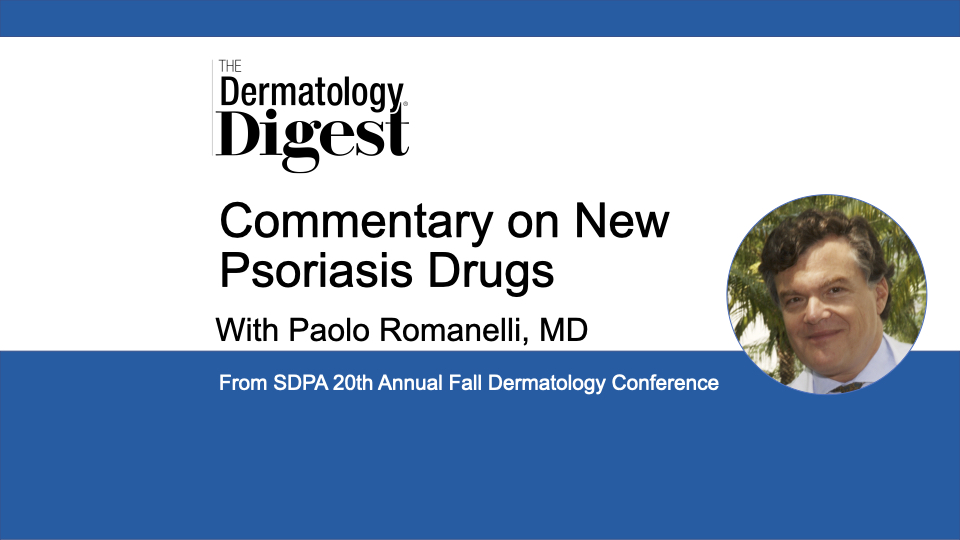Dr. Paolo Romanelli discusses recently approved topical, oral, and intravenous drug options for psoriasis patients, including the different mechanisms of action and indications for use.

Paolo Romanelli, MD, Professor of Dermatology and Dermatopathology, Dr. Phillip Frost Department of Dermatology, University of Miami Miller School of Medicine, Miami, Florida
“The past few years have been rewarding and exciting for psoriasis patients because we have so many good treatments for this devastating skin and more disorder,” said Paolo Romanelli, MD, who presented “New Psoriasis Drugs” during the Society of Dermatology Physician Assistants (SDPA) 20th Annual Fall Dermatology Conference, in Miami, Florida.
The first biologic, alefacept, was approved for psoriasis in 2003 but is no longer available. Since then, many biologics have been approved for psoriasis, which are safe and effective. These are mainly biologics with monoclonal antibodies, given by subcutaneous injection in different regimens, said Dr. Romanelli.
“Biologic injections are effective and very safe. At the same time, some patients are concerned. I tell my patients that there are mainly contraindications to these medications—not really side effects (especially with the new ones). So, sometimes when these contraindications are present, we prescribe topicals.”
New Topical MOAs
Until recently, the only topical options available to these patients were topical steroids, topical vitamin D3 analogs, and sometimes topical calcineurin inhibitors, said Dr. Romanelli.
“Now we have some very effective new topical medications with new mechanisms of action.”
Among those, tapinarof 1% cream (VTAMA, Dermavant), approved in September of 2022, he said.
“It’s a new receptor, an aryl hydrocarbon receptor agonist. Believe it or not, this topical treatment modulates expression of interleukin (IL)-17 and the skin barrier proteins filaggrin and loricrin.”
For patients who don’t want to inject biologic monoclonal antibody or who clear with biologic injection but still have a few stubborn plaques, tapinarof 1% cream can be a fantastic treatment, said Dr. Romanelli.
Another topical treatment approved for psoriasis in July 2022 for patients 12 years and older, roflumilast cream 0.3% (ZORYVE, Arcutis), is a phosphodiesterase 4 inhibitor, he said.
“Roflumilast downregulates tumor necrosis factor (TNF) alpha, interferon gamma, IL-17, and IL-23. It acts pretty much like a monoclonal antibody injection. Sometimes we decide on a treatment according to the subtype of psoriasis. Roflumilast is supposed to work really well on something called inverse psoriasis, which is psoriasis in intertriginous areas. The concentration is 0.3%—3 mg of roflumilast per gram in a 60-gram tube. It’s definitely more specific than topical steroids or vitamin D3 analogue.”
However, topical steroids and vitamin D3 analogues are not completely out of the picture, said Dr. Romanelli.
“There was another product, a topical cream approved in 2020 which is a combination of betamethasone dipropionate and calcipotriene. This is a new formulation. It is PAD technology, with oil in water dispersion for a multimolecular layer of organized surfactant. This is another option for patients who don’t want to do a biologic or may have some psoriasis plaques left after pretty much successful treatment with subcutaneous injection of a biologic.”
Oral and IV Medications
The new oral medication deucravacitinib (Sotyktu, Bristol Myers Squibb) was approved for psoriasis in September 2022. It is a tyrosine kinase 2 (TK2) inhibitor, indicated for moderate to severe plaque psoriasis in adults, according to Dr. Romanelli.
“It’s 6 mg orally, once daily, with or without food. The mechanism of action is Janus kinase (JAK) inhibition. It has good efficacy and safety. As I said, sometimes it’s important to know the subtype of psoriasis and what patients complain the most about. In this case, this oral medication is definitely indicated in scalp psoriasis. Adverse effects include headache, diarrhea and nausea but nothing major.”
Spesolimab (Spevigo, Boehringer Ingelheim), a monoclonal antibody given intravenously that inhibits interleukin-36 (IL-36) signaling was approved in September 2022 for generalized pustular psoriasis flares, he said.
“In psoriasis, we mainly talk about IL-17, IL-23, [and], in the past, IL-12 and TNF alpha. In this case, IL-36 is the main target. This is an intravenous infusion of a single 900 mg dose for 90 minutes. Patients with this severe psoriasis type are doing really well on spesolimab.”
A Pipeline Product
Bimekizumab (UCB) is an investigational humanized immunoglobulin (Ig) G1 monoclonal antibody that selectively inhibits interleukin-17A and IL-17F and may be approved in June 2023, according to Dr. Romanelli.
“Indications are plaque psoriasis and psoriatic arthritis. The dose is 320 mg every four weeks. It is already approved in the European Union, Japan, Canada, and Australia. Hopefully it will be approved very soon in the United States because it is very effective in clinical trials. Efficacy is excellent. Safety, as well, except a few cases of oral candidiasis that we can address with anti-candida treatment.”
Personalized Medicine
With so many treatment options for psoriasis patients, Dr. Romanelli said he has made it his passion to prescribe psoriasis therapy according to cytokine overexpression in a patient’s psoriasis plaques.
“My approach is to biopsy psoriasis plaques, stain for the immunohistochemistry markers (which are commercially available for IL-17, IL-23, IL-36, TNF alpha), and treat with the proper biologics according to the findings. To me, this is the future—targeted therapy, personalized medicine, tailor-made treatment, whatever you want to call it.”
Disclosure: Dr. Romanelli reports no relevant conflicts of interest.


